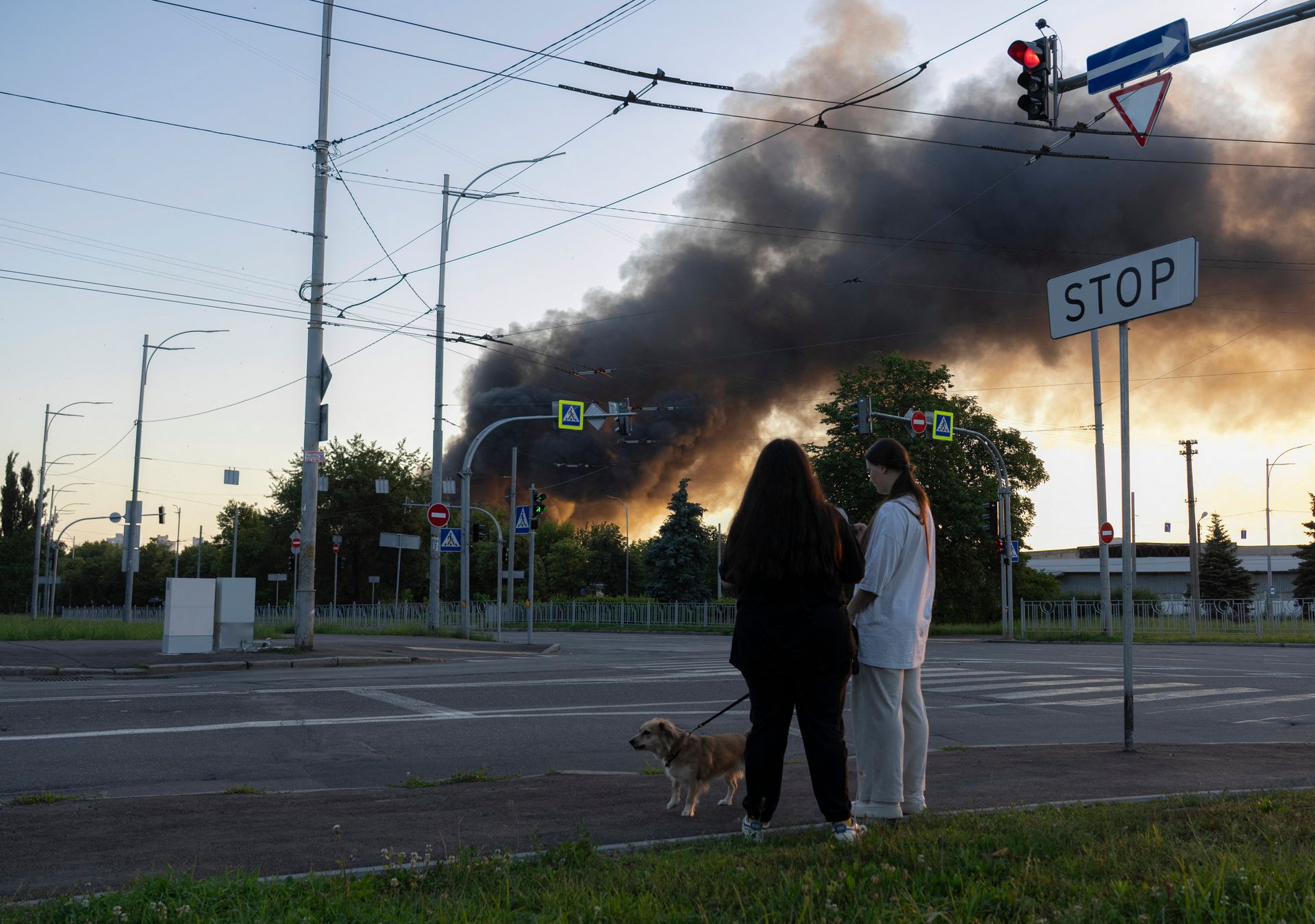Exclusive: Maker of Ukraine's new Flamingo cruise missile facing corruption probe
The country's anti-corruption agency is looking into Fire Point's alleged ties to Zelensky's former associate, and whether the firm inflated contracts with the state.

Launch of the Flamingo cruise missile in an undated photo. (militarnyi.com)
Ukraine's anti-corruption agency has been investigating the country's star deep-strike drone company — Fire Point — over concerns it misled the government on pricing and deliveries, five sources with knowledge of the investigation told the Kyiv Independent.
The National Anti-Corruption Bureau, or NABU, is also looking into the co-owner of President Volodymyr Zelensky's former film studio as the alleged ultimate beneficiary of the company, sources said.
Until recently, the weapons maker was virtually unknown outside of Ukraine's defense circles, despite appearing to be one of the largest — if not the largest — recipient of Defense Ministry drone budget funds, according to documents obtained by the Kyiv Independent.
But over the past weeks, Fire Point has gone on a charm offensive, promoting its FP-1 deep-strike drones and "Flamingo" cruise missile in Western media. In his first public comments about the weapon, Zelensky last week called the Flamingo Ukraine's "most successful" missile the country has in its arsenal to defend against Russia's nearly four-year full-scale invasion. Ukraine has prioritized developing long-range strike drones and cruise missiles to hit Russian targets far behind the front lines and slow Moscow's war machine.
As part of the investigation, NABU is probing concerns that Fire Point inflated either the value of its components or the number of drones it delivers to the military, or both, according to the sources, who include current and former government officials and industry representatives, all of whom agreed to speak on condition of anonymity to discuss the investigation and company details.
When contacted, a spokesperson for NABU declined to comment, saying the agency could not discuss it "as it concerns the secrecy of investigations."
Fire Point confirmed the existence of an investigation to the Kyiv Independent but downplayed its significance, denying the accusations and portraying the investigation as based on rumors spread by opponents and part of wider probes into Ukraine's defense procurement system.
"It makes no sense to look for the secrets where there are no secrets," Iryna Terekh, Fire Point’s chief technology officer, told the Kyiv Independent.
Wartime secrecy has kept weapons production largely in the shadows. While it is currently unclear how far along NABU's investigation into Fire Point is, the probe marks one of the most significant known inquiries into Ukraine’s fast-growing drone and missile industry — and into its new darlings of defense production. It also comes on the heels of a government crackdown on NABU last month, widely seen as a response to the agency’s scrutiny of Zelensky’s associates.
The current NABU investigation is tracing the firm's ultimate ownership to Timur Mindich, a businessman who co-owns Kvartal 95, the television studio started by Zelensky, three of the sources said. As the investigation is ongoing, no charges have been brought against any individuals or entities.
"Rumors are going around pretty actively that (Fire Point's) drones are linked with Mindich, and I have every conviction that this version of events corresponds to reality," the government source, who is familiar with the investigation's materials, told the Kyiv Independent. NABU did not respond to any questions regarding Mindich.
The Kyiv Independent was able to reach an attorney for Mindich, who said they had no information on a connection between their client and Fire Point.
Rise of Ukraine's drone prodigy
According to documents seen by the Kyiv Independent, the firm sold Hr 13.2 billion worth of its FP-1 long-range drones — roughly $320 million — to the government in 2024. Per its annual budget, the Defense Ministry spent a total of Hr 43 billion ($1.04 billion) on drones that year, giving Fire Point just under a third of the total.
Terekh told the Kyiv Independent that the firm sold around 2,000 long-range drones in 2024. The firm sells the drones for roughly $55,000 each, which would total around $110 million in sales.
Between 2023 and 2024, the company's revenue, according to publicly available corporate documentation, grew from $4 million to over $100 million. Terekh told the Kyiv Independent that Fire Point's staff grew from 18 in 2023 to 2,200 employees in the present day.
A source with knowledge of Fire Point’s contracts says the company is set to receive more than $1 billion in 2025 from government contracts. Terekh acknowledged receiving funds via the "Danish model" of European funding going to Fire Point via the Defense Ministry.
Fire Point also received funding as part of a 5-billion-euro deal with the German government, announced in May, Terekh told the Kyiv Independent.
The former government official, who had direct knowledge of the contracts, told the Kyiv Independent that among drone companies receiving government funds, Fire Point was "without a doubt the top."

A recent Associated Press interview with Fire Point reported the firm was producing 100 of its long-range FP-1 drones per day. Those numbers would total around $2 billion annually. Terekh told the Kyiv Independent that 100 in a day is the maximum the firm can produce. Between contracts, they do not hit those quotas, but they are set to produce roughly 9,000 this year, she said. Those figures don't include its FP-5 "Flamingo" cruise missiles that it similarly began advertising recently.
It is currently impossible to confirm Fire Point's production figures independently. The effectiveness of its weapons is also difficult to gauge, as the government does not publicize that information. Terekh put the percentage of their drones that hit their Russian targets at 55-60%.

According to the Kyiv Independent's reporting, the FP-1 is today an effective deep-strike drone, but that did not seem to be the case in 2024 — when the company was already selling large quantities of the drone to the Defense Ministry.
The two industry sources allege that within a short time after formation in 2023, the company was turning out barely functional drones while receiving massive preferential funding from the government.
While producing ineffective drones in its early days is neither illegal nor necessarily unethical, a company that benefits from political favoritism while delivering a subpar product raises questions about oversight and accountability. In the case of Fire Point, it looks to have been designated as the heir apparent of Ukraine’s deep-strike ambitions from the outset.
The people behind Fire Point
According to the source in the government, the investigation began roughly four months ago — shortly before a high-profile crackdown by the Zelensky administration to curtail NABU's independence last month.
The government source told the Kyiv Independent that Fire Point's origins "seem to be a priority for (NABU’s investigation) at the moment."
There are no obvious links between Fire Point and Mindich. It’s not clear how the NABU investigation is tracing the connection to Zelensky’s former business associate.
The people formally linked to Fire Point are new to the drone industry. The company's two publicly identifiable leaders are Yehor Skalyha, the legal owner, and Terekh.
Following the start of the full-scale invasion, the two fundraised for a non-profit organization called Civic Hub, which turned into a long-range drone project, according to the NGO’s website and social media posts. Terekh also ran Frieden, a charity fund based in Germany.
Skalyha, for his part, is a veteran of Ukraine's film industry and did the location scouting for Ukrainian movies "Luxembourg, Luxembourg" and "Egregor."
The corporate entity Fire Point was under the name Centrocast until formal ownership was handed over to Skalyha in February 2023, accompanied by the name change to Fire Point, per publicly available corporate documents.
Terekh claims that she runs Fire Point along with Skalyha and Denys Shtilierman, an engineer and designer, and says they funded the project themselves until the Ukrainian government started buying their drones.
Back in 2019, Skalyha signed a letter of protest against former President Petro Poroshenko’s attack on Ukraine’s film agency, alongside other members of Ukraine’s film industry, including current Presidential Office Head Andriy Yermak and several Kvartal associates.
Terekh's background is equally unrelated to the defense industry. Her previous firm, the Terekh.Group, created artful concrete installations, for which she ended up on Forbes Ukraine’s 30 under 30 list in 2022.
Then, in December of last year, she was selected to be on a business council that met in the President's Office, in the ranks of many of the wealthiest businesspeople in the country. Sira Rechovyna, the corporate entity behind Terekh.Group, has never reported an annual revenue above $70,000.
And at the end of April, Yermak named both Terekh and Skalyha to a new government council of 82 businesspeople, alongside business leaders from cellular giant Kyivstar and Ukraine’s answer to Amazon, Rozetka. In that council, Terekh was listed under Terekh.Group.
The Kyiv Independent reached out to the President's Office, asking about any connections it has with Fire Point, but did not receive a reply by the time of publication.
"Nobody can choose between Yermak and Mindich as to who we are associated with," Terekh quipped, dismissing high-powered political backing as rumors. She also blamed the Digital Transformation Ministry for targeting Fire Point with rumors, saying that NABU had "copy-pasted" claims from the ministry in its investigation.
Terekh acknowledged broad issues of corruption in Ukraine’s defense procurement and their effect on the front line. "I understand why people are so skeptical — I would also be skeptical."
"The worst possible human thing that can happen during a war is to steal from the war," said Terekh.
Editor's note: Nov. 25: This article originally spelled Denys Shtilierman's name as Shtylerman. It has been updated to reflect the English spelling he uses in his first public appearances.
Author's note:
Hi, this is Kollen, the author of this article. Thanks for reading. Many stories of wartime Ukraine are of resistance. This one is not, but it still needs to be told. If you want more stories like this, consider joining our community today to help support our work.












